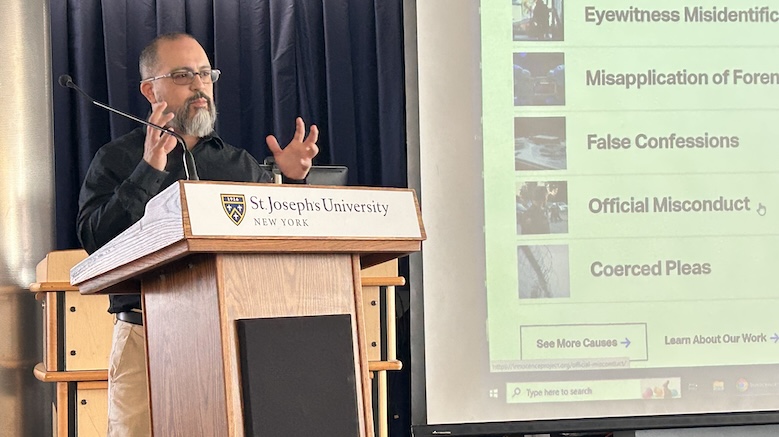In a poignant and gripping presentation at St. Joseph’s University, New York’s Long Island Campus, Carlos Sanchez shared his harrowing journey of what he maintains was a wrongful murder conviction, his 25-year incarceration, and the struggle to rebuild his life after being released from prison.
Sanchez spoke eloquently to a crowd of students, professors and staff about the horrors of life behind bars, his battle to gain release from prison and clear his name, and the challenges of readjusting to civilian life.
“I had to figure out how to survive,” Sanchez recalled during last month’s presentation. “My appeals were denied, and I had to manage my life when they told me there was nothing else I could do.”
Despite facing numerous setbacks and rejections in his pursuit of justice, Sanchez’s perseverance never waned. “I stopped dreaming about freedom,” he admitted. “But I kept fighting, even when it felt hopeless.”
Sanchez was convicted of murdering his girlfriend in 1992. He and his attorneys maintained he did not commit the crime, and he was ultimately granted parole in January 2017 and released four months later.
During his incarceration, The Innocence Project, a renowned organization founded in 1992 by lawyers Peter Neufeld and Barry Scheck, took up Sanchez’s case and championed his cause for years. The organization is still working to overturn his conviction.
Sanchez was 17 when, after an eight-hour interrogation by police without a lawyer or guardian present, he signed a confession taking responsibility for the murder, according to The Innocence Project.
The confession was the only evidence linking him to the crime, and it was taken under circumstances now known to be associated with false confessions, The Innocence Project attests. The statement was also at odds with physical evidence collected in the case, the organization said.
During his presentation, Sanchez recounted the emotional toll of his incarceration and his arduous journey toward exoneration.
After years of legal battles and struggles, Sanchez’s perseverance finally paid off. Granted parole, he left prison, having spent a quarter-century behind bars.
However, the transition to life outside prison has been far from easy for Sanchez.
“It’s been difficult to get out of the house, to figure out how to go on,” he said. “I have too many habits that I created in prison that don’t work out here.”
Despite the challenges he continues to face, Sanchez indicated that he remains determined to move forward.
“I keep getting up, and I keep moving forward,” said Sanchez, who obtained associate’s and bachelor’s degree in math while in prison. “What I’m doing today is going to matter for tomorrow.”


